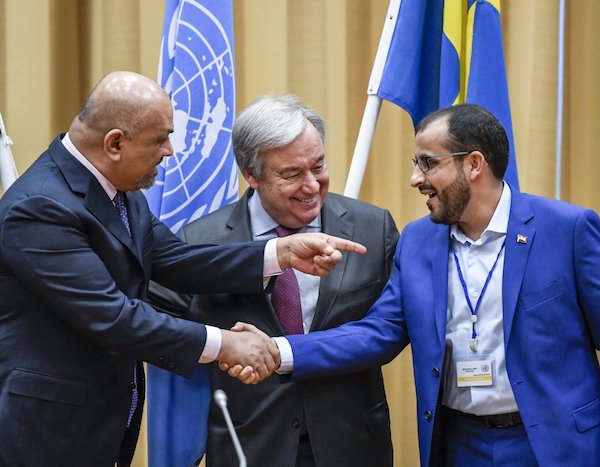Yemeni min, houthi negotiator shook hands, to avoid world's worst humanitarian crisis

UN chief Antonio Guterres announced Thursday a series of breakthroughs in talks with rivals in the Yemen conflict, including a ceasefire for a vital port.
In a highly symbolic gesture on the seventh and final day of the UN-brokered peace talks in Sweden, Yemeni Foreign Minister Khaled al-Yamani and rebel negotiator Mohammed Abdelsalam shook hands to loud applause.
However, a number of issues remain unresolved and a new round of talks with take place at the end of January, Guterres said.
The conflict has triggered what the UN calls the world's worst humanitarian crisis, with 14 million Yemenis now at the brink of mass starvation.
Guterres, who flew into Sweden late Wednesday, announced that the government and Huthi rebels had agreed on a ceasefire in the port of Hodeida, the main entry point for imported food and aid.
"There is a ceasefire declared for the whole governorate of Hodeida in the agreement and there will be both from the city and the harbour a withdrawal of all forces," he told reporters.
UN special envoy Martin Griffiths, who is due to brief the Security Council on Yemen on Friday, said the pullout should take place "within days".
Guterres said the United Nations would play a "leading role" in monitoring the Red Sea port, which is currently controlled by the rebels, and facilitate aid access to the civilian population.
In addition, the rivals have reached a "mutual understanding" on Yemen's third city of Taiz, the scene of some of the most intense battles in the conflict.
But no deal has been reached on the future of the airport in the capital Sanaa or on economic measures that are vital to helping the country's population.
The January talks will focus on a framework for negotiations on a political process, which Guterres said was the only solution to the conflict.
International pressure has been mounting to halt the fighting between the Iran-linked Huthis and the government of Abedrabbo Mansour Hadi, backed by Saudi Arabia and its military allies, with the US Senate, Saudi Arabia and the UAE honing in on the fragile talks.
The warring parties have been in the rural Swedish village of Rimbo for a week to try to hammer out an agreement on a number of key issues.
The rebels control both Hodeida and the capital Sanaa while the Saudi led-military coalition controls Yemen's maritime borders and airspace.
Sanaa airport has been closed to commercial flights for nearly three years and Griffiths said its fate would be discussed at the next round.
"It's clear and it's public knowledge that starting point is opening up to commercial flights, maybe domestic at first, and eventually (international)," he added.
The foreign ministers of Britain, the UAE and Saudi Arabia were in Rimbo for the last day of negotiations.
Britain's Jeremy Hunt notably met with both the government and rebels at the talks.
Anger at the human cost of the war, as well as outrage over the killing of US-based journalist Jamal Khashoggi in the Saudi consulate in Istanbul, have prompted a harder line in the international community over the Yemen war, and particularly the role of the Saudi-led coalition.
The US Senate on Wednesday voted to advance a resolution that ends US backing for the Saudi-led intervention by 60 votes to 39, with 11 Republicans joining Democrats to back the measure.
The final vote is expected to take place on Thursday. However, if the upper house approves the resolution, it is likely to run aground in the lower House of Representatives where Republicans hold the majority until January 3.
Both the rebels and government alliance stand accused of failing to protect civilians.
The UN last year blacklisted the Saudi-led coalition for the killing and maiming of children in air raids.
The Sweden talks mark the first meeting in two years between the northern Huthi rebels and the Hadi government that has been backed since 2015 by the Saudi-led coalition.
The last round of talks, hosted by Kuwait in 2016, collapsed after more than three months of negotiations with no breakthrough.
(With inputs from agencies.)
ALSO READ
Madhya Pradesh woman gang-raped in Rajasthan's Kota, seven accused arrested
Madhya Pradesh: Indore Police arrest civic official for alleged rape
Under PM Modi's leadership, cultural heritage of country has been restored: Madhya Pradesh CM Yadav
Madhya Pradesh CM extends greetings to people ahead of Hindu New Year
Rahul Gandhi stranded overnight in Madhya Pradesh after helicopter grounded; BJP mocks situation with 'no take off' joke










